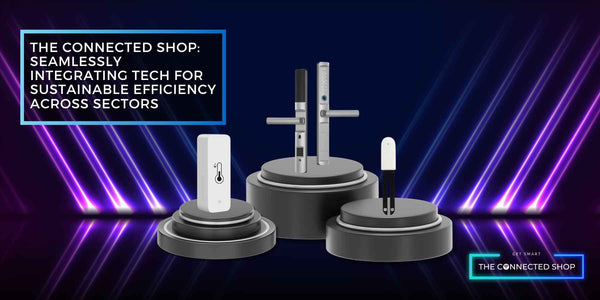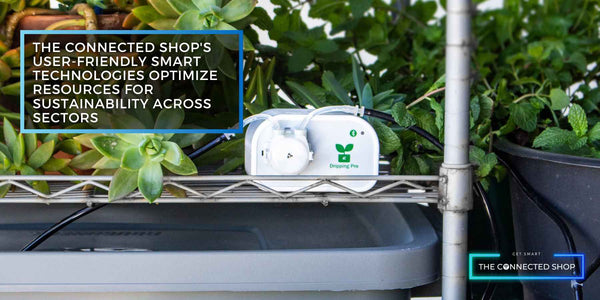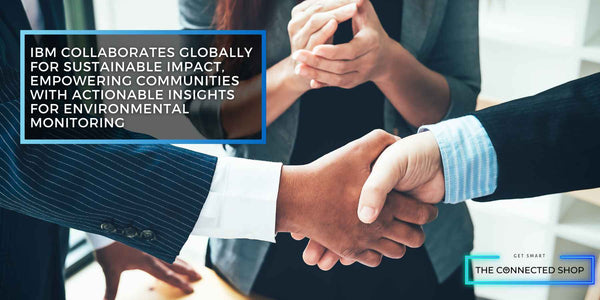The Impact of Smart Technology on Sustainability: A Conversation with Nick Zennaro from The Connected Shop and Daryl Pereira from IBM
The Intersection of Technology and Social Good
In a world where technology is advancing at an unprecedented pace, entrepreneurs and business leaders are increasingly harnessing its power for social good. This is the core theme of the Impact Up podcast, where stories of innovation intersect with sustainability. In a recent episode, Daryl Pereira, a senior content strategist at IBM, engaged in a compelling dialogue with Nick Zennaro, the owner and founder of The Connected Shop, an online store specializing in smart devices. Their conversation delved into the profound impact of smart sensors on agriculture and construction, shedding light on how these technologies are reshaping sustainability efforts.
Exploring The Connected Shop's Journey: From Retail to Sustainability Advocacy
The Connected Shop, headquartered in Miami, Florida, initially focused on retail but gradually shifted its attention to specific business verticals. Nick highlighted the company’s commitment to providing meaningful technologies that enhance comfort, security, and sustainability. Through smart devices like sensors and smart door locks, businesses can monitor energy consumption, detect leaks, and optimize resource usage, thereby driving sustainability initiatives.

The Evolution of Sustainability: From Business Byproduct to Core Mission
While sustainability wasn't the primary focus at the inception of The Connected Shop, Nick emphasized how it became a natural byproduct of the benefits offered by their technologies. By empowering users with data-driven insights, these devices enable informed decision-making, leading to more efficient resource utilization and environmental conservation. In this podcast, Nick cited examples from smart agriculture, where plant sensors optimize water and fertilizer usage, resulting in healthier plants and reduced environmental impact.

Central to The Connected Shop's ethos is the seamless integration of hardware and software to deliver user-friendly solutions. Nick emphasized the importance of simplicity and accessibility, ensuring that users, regardless of technical expertise, can leverage these technologies effectively. By providing actionable insights without overwhelming users with excessive data, The Connected Shop fosters a positive user experience conducive to sustainable practices.
Expanding beyond individual applications, Nick discussed the broader implications of smart technologies in sectors like construction and agriculture. From remote access control to water leak detection, these innovations not only optimize resource usage but also mitigate environmental risks and economic losses. By harnessing data-driven insights, businesses and individuals can collectively contribute to building a more sustainable society.
Collaboration for Impact: IBM's Initiatives in Sustainability
Daryl further highlighted IBM's collaboration with organizations like Texas A&M AgriLife and Deltares to develop open-source solutions for environmental monitoring. Leveraging AI and big data analytics, these initiatives empower farmers and communities with actionable insights, enhancing resource management and resilience in the face of environmental challenges.
In addressing challenges of accessibility, Daryl emphasized the importance of tailoring solutions to diverse socio-economic contexts. Whether through low-cost hardware or mobile messaging platforms, efforts are underway to ensure that the benefits of smart technologies reach underserved communities, driving inclusive sustainability initiatives globally.

Despite the promising prospects, challenges remain, particularly regarding access and affordability. However, initiatives like IBM's Sustainability Accelerator are working to overcome these barriers by developing lower-cost solutions and leveraging mobile technologies to reach underserved communities. By understanding the diverse needs of different markets and tailoring solutions accordingly, companies can ensure that sustainable technology is accessible to all.
Conclusion
The Connected Shop exemplifies how technology can be a force for good, driving positive change in society while also delivering tangible benefits to businesses and individuals. Through a combination of innovation, data-driven insights, and a commitment to sustainability, companies like The Connected Shop are not just shaping the future of technology but also paving the way for a more sustainable world. As we continue to harness the potential of smart technology, the possibilities for creating a brighter, greener future are limitless.
